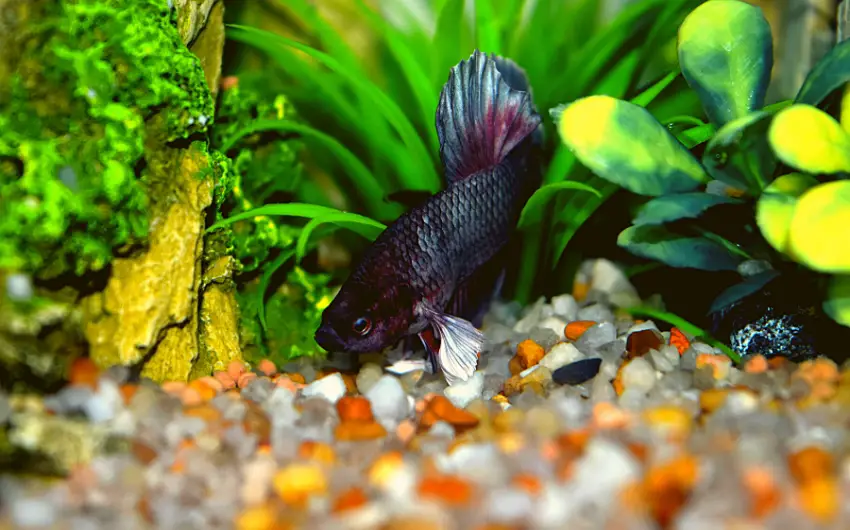Many betta enthusiasts have asked Is my betta fish dead or sleeping? Betta fish are popular with aquarium enthusiasts due to their striking colors and lively personalities.
However, it’s not uncommon for betta owners to worry whether their betta fish is dead or just sleeping.
If you’re unsure whether your fish is alive or deceased, don’t panic! In this article, we’ll discuss the seven telltale symptoms to look for to decide if your betta fish is sleeping or dead.

By the end of this ultimate blog post, you’ll be equipped with the understanding you need to ensure your pet’s well-being and keep them healthy and happy in their aquatic home.
Table of Contents
ToggleUnderstanding Betta Fish Sleep
Betta fish, territorial to Southeast Asia, are known for their unique sleeping habits. Unlike humans, bettas don’t close their eyes when they sleep.
Instead, they enter a state of rest where their activity level decreases, and become less responsive to their surroundings. It’s easy to mistake a sleeping fish, especially for new betta fish owners.
Before diving into the signs that distinguish between a sleeping betta fish and a dead one, it’s essential to understand how these fish sleep.

Betta fish are labyrinth fish, which means they have a specialized labyrinth that allows them to breathe air directly from the surface. This adaptation allows them to survive in oxygen-deprived waters.
Past few days. When bettas sleep, they often rest near the water’s surface, close to the top of the tank. However, they can also sleep at the bottom or on plant leaves.
It’s important to note that betta fish don’t experience rapid eye movement (REM) sleep like humans or other animals. Instead, they enter a state of restful inactivity.
Differentiating Between Sleeping and Dead Betta Fish
To determine whether your betta is sleeping or dead, you need to observe your betta-specific signs that indicate its current state.
Understanding these signs of a sleeping betta fish and a dead one can alleviate concerns and provide appropriate care.
Let’s explore the signs that can help you differentiate between the two.
Signs of a Sleeping Betta Fish
What does a dead betta look like? When your betta fish is sleeping, you may notice the following signs:
- a) Reduced Movement: Sleeping bettas will exhibit minimal movement and may appear still or stationary. It is normal for their activity level to decrease during sleep.
- b) Regular Breathing: While asleep, bettas continue to breathe, but at a slower rate. You may observe gentle gill movement as they take in oxygen from the water.
- c) Intermittent Fins Movement: The fins of a sleeping betta fish may occasionally move slightly, but they won’t be as active as when the fish is awake.
- d) Resting Position: Betta can choose different positions when sleeping. They may lie on the tank’s bottom, rest on plant leaves, or hover near the water’s surface. These resting positions can vary depending on their comfort and preference.
Signs of a Dead Betta Fish
It’s crucial to know the signs that your betta may have passed away. These signs include:
- No Movement: A dead betta fish will show no movement. Its body will be still and unresponsive.
- No Gill Movement: Unlike a sleeping betta fish, a dead one will not exhibit gill movement. The mouth and gills will appear motionless.
- Loss of Color: When betta fish die, they often experience a loss of color. Their vibrant hues may fade, and the body might become pale or discolored.
- Fins Clamped Shut: The fins of a deceased betta fish tend to be clamped tightly against its body, giving a lifeless appearance.
- Unresponsive to Stimuli: If you tap on the tank or try to engage the fish, there is no response, which may indicate that the fish has passed away.
It’s important to note that sometimes a sleeping betta fish can appear dead, leading to confusion. Observing the following factors can help you make a more accurate determination.
Factors That Influence Betta Fish Sleep
Several factors can influence the sleeping patterns and behavior of betta fish. Understanding these factors can help you better interpret your fish’s sleeping habits and overall well-being. Let’s explore them:
Light and Darkness
Betta fish are diurnal creatures, meaning fish are active during the day and keep sleeps at night. They are more likely to sleep in darker environments. Providing appropriate lighting conditions in the tank can help regulate their sleep-wake cycle.
Water Temperature
The water tank temperature significantly influences a betta fish’s sleep patterns. Bettas are tropical fish and thrive in warm water. Maintaining a suitable temperature between 78 and 82 degrees Fahrenheit (25.5°C and 27.8°C) promotes healthy sleep.
Tank Environment
Creating a comfortable and stress-free aquarium for your betta fish is essential. A well-maintained aquarium with appropriate hiding spots, plants, and sufficient space can improve sleep quality.
Betta Fish Behavior
Each betta fish has its unique personality and behavior. Some bettas may be more active during the day, while others may prefer to sleep during certain hours. Understanding your fish’s typical behavior can help you identify any changes that might indicate a problem.
How to Know If Your Betta Fish Is Sleeping or Dead?
How to Tell If Your Fish Is Sleeping or Dead? To tell if your betta is still alive, You can observe specific indicators to determine whether your betta fish sleeping or dead.
Here are some important signals to look out for:
– Observing Breathing Patterns
Watch your betta fish closely and pay attention to its breathing. A sleeping betta fish will exhibit slow and steady gill movement as it takes oxygen from the water. On the other hand, a dead betta fish will show no gill movement at all.
– 5.2 Examining Body Movement
Observe any slight movements in your betta fish’s body. A sleeping fish may twitch or make small adjustments in its position. In contrast, a dead betta fish will remain completely motionless.
– Checking for Gills and Mouth Movement
Look closely at your betta fish’s gills and mouth. Sleeping bettas will gently move in these areas as it continues to breathe. If there is no movement, it could indicate that the fish has died.
– Assessing Coloration and Fins
Observe the coloration of your fish. A sleeping betta fish will retain its vibrant colors, while a dead fish may appear dull or pale. Additionally, a deceased betta fish’s fins tend to be clamped tightly against its body, whereas a sleeping fish may have relaxed and flowing fins.
– Tapping the Tank
Gently tap on the side of the betta tank and observe the response. A sleeping betta fish may show some reaction, such as a slight movement or change in position. However, a dead betta fish will not respond to external stimuli.
– Water Parameters
Monitor the water parameters in your betta fish tank. Sudden temperature, pH, or ammonia changes can cause stress and affect their health. Maintaining optimal water conditions is important to ensure your betta fish’s well-being.
By considering these signs and factors, you can better understand whether your betta fish is sleeping peacefully or has unfortunately passed away. Being patient and observant is important when assessing your fish’s condition.
Tips for Caring for Sleeping Betta Fish
If you have determined that your fish is indeed sleeping, here are some tips to ensure they have a comfortable sleep environment and receive proper care:
Creating a Suitable Sleep Environment
Provide your betta fish with a well-maintained tank that mimics its natural habitat. Include hiding spots, live plants, and other decorations to create a sense of security. Bettas appreciate having areas to retreat to when they want to rest.
Providing Proper Lighting
Betta fish need a balance between light and darkness. During the day, provide them with around 8-12 hours of light, which can be achieved through aquarium lights at night. Ensure the tank is in a dark, quiet area at night to promote uninterrupted sleep.
Maintaining Water Quality
Regularly monitor and maintain the water quality in your betta tank. Perform routine tank water changes to keep the water clean and free from harmful substances. Clean the tank with equipment, such as filters, to ensure optimal functioning.
Ensuring Adequate Nutrition
Provide your fish with a varied and nutritious diet. Feed them various high-quality betta fish pellets, flakes, or frozen foods. Avoid overfeeding bettas, as it can lead to health issues. A well-fed betta fish is more likely to sleep soundly.
By implementing these betta care tips, you can create an environment that supports your fish’s sleep and overall well-being.
Is My Betta Fish Dead or Sleeping Frequently Asked Questions (FAQs)
Can Betta Fish Sleep During the Day?
Yes, betta can sleep during the day. While they are diurnal and generally more active during daylight hours, it is not uncommon for them to take short naps during the day. This behavior is influenced by light intensity and individual sleep patterns.
How Long Does Betta Fish Sleep?
Betta fish typically require around 8-12 hours of sleep per day. However, the duration of their sleep can vary from fish to fish. Some bettas may sleep for shorter periods, while others may sleep for longer stretches. It’s important to allow them long time to rest and rejuvenate.
Should I let My Betta Fish Sleep with the Light On?
No, providing your betta with a dark and quiet environment during their sleep is best. Leaving the tank light on continuously can disrupt their natural sleep-wake cycle and may cause stress. Mimicking their natural habitat with a regular light-dark cycle is essential for their well-being.
How Can I know if My Betta Is Sick or Just Sleeping?
It may indicate illness if you notice unusual changes in your betta fish’s behavior, appearance, or eating habits. Look for red flags such as loss of appetite, swim bladder, lethargy, fin deterioration, or unusual growth. If you suspect your betta fish is sick, it’s important to consult a veterinarian who specializes in fish care for a proper diagnosis and treatment.
Is it Normal for My Betta Fish to Lie on the Bottom of the Tank?
Yes, it is normal for a betta to rest or lie on the bottom of the tank occasionally. They may do so during their sleep or take a break. However, suppose your betta fish like spending extended periods of time lying on the bottom and showing signs of distress or illness. In that case, it is critical to investigate further to ensure their well-being.
Do Bettas Float When They Die?
Bettas can float on the top of a tank when they die, but not all floating bettas are dead. Bettas are known to rest near the surface of the water, which can give the appearance that they are floating. However, if your betta is floating at the surface and not responding to your attempts to move them, it could be a sign that they have passed away. Ior or appearance should be cause for concern.
Conclusion
In conclusion, determining whether your betta fish is dead or sleeping can be a stressful experience for any pet owner. However, knowing the main differences between sleeping and a dead betta, you can quickly determine your fish’s condition and take appropriate action. Understanding the signs distinguishing between a sleeping betta fish and a deceased one is crucial for betta fish owners. You can accurately determine their state by observing their breathing patterns, body movement, coloration, and response to stimuli. Creating a suitable sleep environment, maintaining proper lighting, and ensuring optimal water conditions are essential for the well-being of your fish.
Remember to follow the betta fish’s behavior and environment, as a healthy and happy aquarium fish is a joy to behold. If you suspect your betta fish may be unwell, don’t hesitate to seek advice from a veterinarian or an experienced fish keeper. By staying vigilant and informed, you can ensure that your betta fish remains a vibrant and beloved household member for years. Thank you for reading time, and we hope this definitive blog post has helped answer the question, “Is my betta fish dead or sleeping?
You might also like
- Betta Fish Laying on its Side But Not Dead: 3 Causes & Treatment
- Why Is My Betta Fish Laying on the Bottom of the Tank and Not Eating?
- How to Tell If Betta Is Dying of Old Age? (7 Clear Signs & What To Do)
- 5 Reasons Why Do Bettas Play Dead (Uncovered & Solved)
- Can Betta Fish See in the Dark! (Is It Even Possible?)
- Why Is My Betta Fish Hiding at the Bottom of the Tank?
- Why Does My Betta Fish Not Eating and Laying at Top: (5 Reasons & Cure)
- How Do Betta Fish Sleep: 5 Ways to Catch Them Snoozing (Solved)
- Can Betta Fish Eat Tropical Flakes! (3 Better Alternatives)




